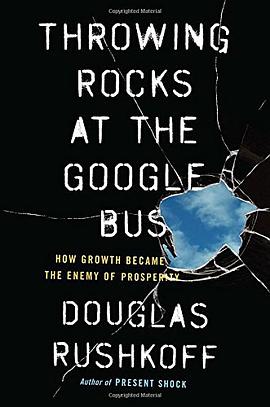Throwing Rocks at the Google Bus: How Growth Became the Enemy of Prosperity Goodreads 豆瓣
作者:
Douglas Rushkoff
Portfolio
2016
- 3
其它标题:
Throwing Rocks at the Google Bus
Capital in the Twenty-First Century
meets
The Second Machine Age
in this stunning and optimistic tour de force on the promise and peril of the digital economy, from one of the most brilliant social critics of our time.
Digital technology was supposed to usher in a new age of endless prosperity, but so far it has been used to put industrial capitalism on steroids, making it harder for people and businesses to keep up. Social networks surrender their original missions to more immediately profitable data mining, while brokerage houses abandon value investing for algorithms that drain markets and our 401ks alike--all tactics driven by the need to stoke growth by any means necessary. Instead of taking this opportunity to reprogram our economy for sustainability, we have doubled down on growth as its core command. We have reached the limits of this approach. We must escape the growth trap, once and for all.
Media scholar and technology author Douglas Rushkoff--one of today's most original and influential thinkers--argues for a new economic program that utilizes the unique distributive power of the internet while breaking free of the winner-take-all system the growth trap leaves in its wake. Drawing on sources both contemporary and historical, Rushkoff pioneers a new understanding of the old economic paradigm, from central currency to debt to corporations and labor.
Most importantly, he offers a series of practical steps for businesses, consumers, investors, and policymakers to remake the economic operating system from the inside out--and prosper along the way. Instead of boycotting Wal-Mart or overtaxing the wealthy, we simply implement strategies that foster the creation of value by stakeholders other than just ourselves. From our currency to our labor to the corporation, every aspect of the economy can be reprogrammed with minimal disruption to create a more equitably distributed prosperity for all.
Inspiring and challenging, Throwing Rocks at the Google Bus provides a pragmatic, optimistic, and human-centered model for economic progress in the digital age.
meets
The Second Machine Age
in this stunning and optimistic tour de force on the promise and peril of the digital economy, from one of the most brilliant social critics of our time.
Digital technology was supposed to usher in a new age of endless prosperity, but so far it has been used to put industrial capitalism on steroids, making it harder for people and businesses to keep up. Social networks surrender their original missions to more immediately profitable data mining, while brokerage houses abandon value investing for algorithms that drain markets and our 401ks alike--all tactics driven by the need to stoke growth by any means necessary. Instead of taking this opportunity to reprogram our economy for sustainability, we have doubled down on growth as its core command. We have reached the limits of this approach. We must escape the growth trap, once and for all.
Media scholar and technology author Douglas Rushkoff--one of today's most original and influential thinkers--argues for a new economic program that utilizes the unique distributive power of the internet while breaking free of the winner-take-all system the growth trap leaves in its wake. Drawing on sources both contemporary and historical, Rushkoff pioneers a new understanding of the old economic paradigm, from central currency to debt to corporations and labor.
Most importantly, he offers a series of practical steps for businesses, consumers, investors, and policymakers to remake the economic operating system from the inside out--and prosper along the way. Instead of boycotting Wal-Mart or overtaxing the wealthy, we simply implement strategies that foster the creation of value by stakeholders other than just ourselves. From our currency to our labor to the corporation, every aspect of the economy can be reprogrammed with minimal disruption to create a more equitably distributed prosperity for all.
Inspiring and challenging, Throwing Rocks at the Google Bus provides a pragmatic, optimistic, and human-centered model for economic progress in the digital age.

